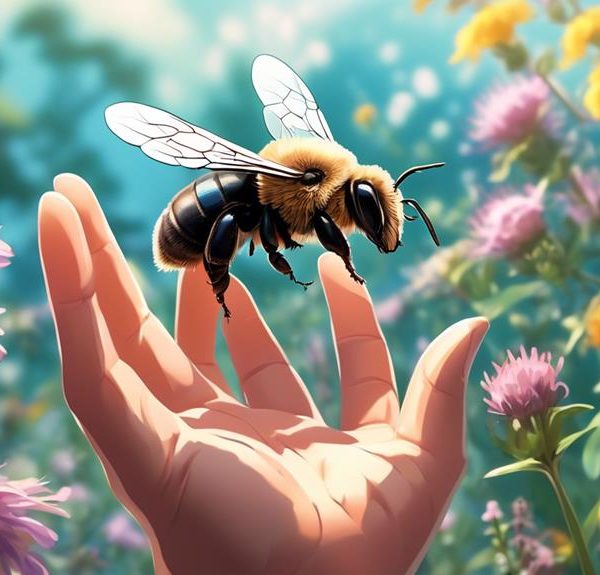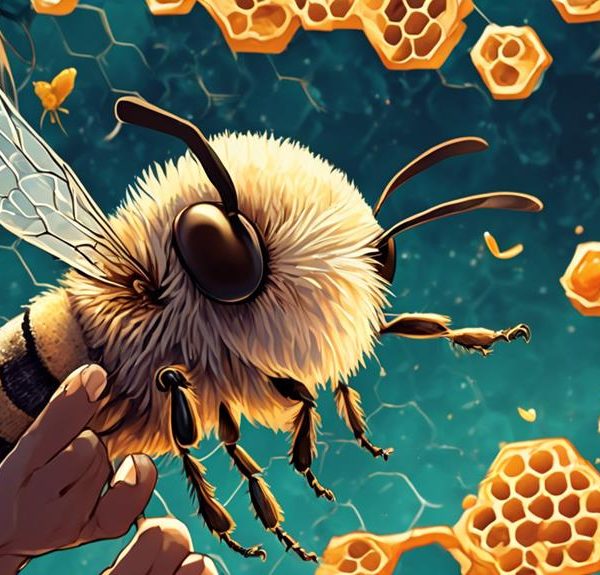Open your mind to the intriguing world of mason bees, their dual role as pollinators and potential home damage-causers, begging the question – are they destructive?
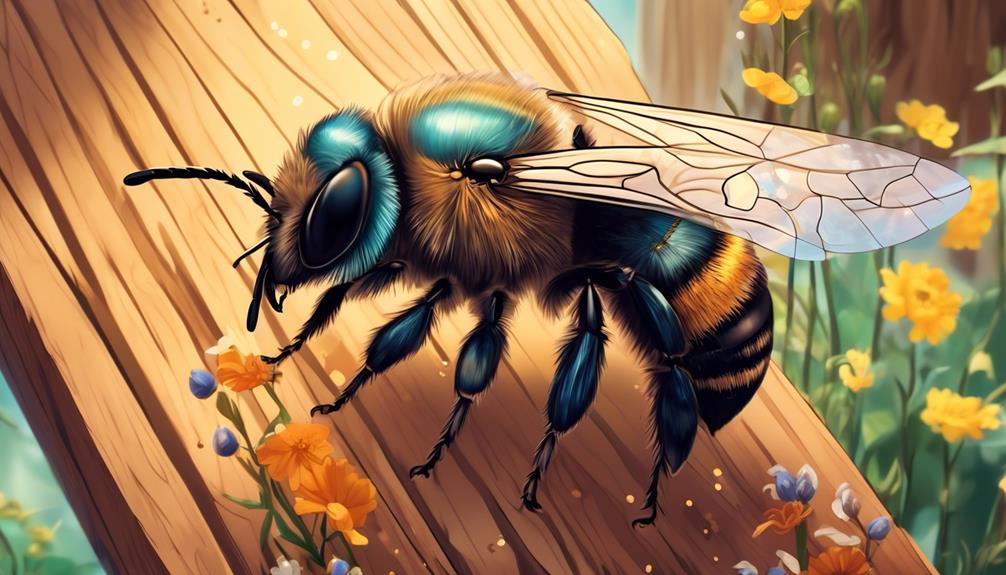
Are Mason Bees Destructive
Just as a coin has two sides, mason bees, too, present a dichotomy – they are both beneficial and potentially harmful. You've probably heard about their reputation as prolific pollinators, but have you ever considered the potential downside? It's not unusual to wonder if these industrious little insects could be causing unseen damage.
Could the mason bee, a friend to your garden, be an enemy to your home? We're here to delve into that mystery, peeling back the layers and uncovering the truth about these fascinating, yet often misunderstood creatures.
This exploration promises to be both enlightening and thought-provoking.
Key Takeaways
- Mason bees are exceptional pollinators, with one bee being as effective as 100 honeybees.
- Mason bees repurpose existing holes and do not create new ones, which can fill gaps and prevent more destructive species from exploiting them.
- Mason bees can cause minor structural damage to untreated wooden structures by boring into wood to create nesting sites.
- Mason bees are typically not destructive to homes like termites or carpenter bees, but they may cause minor structural issues if they nest in crevices and small openings within the home's structure.
Understanding Mason Bees
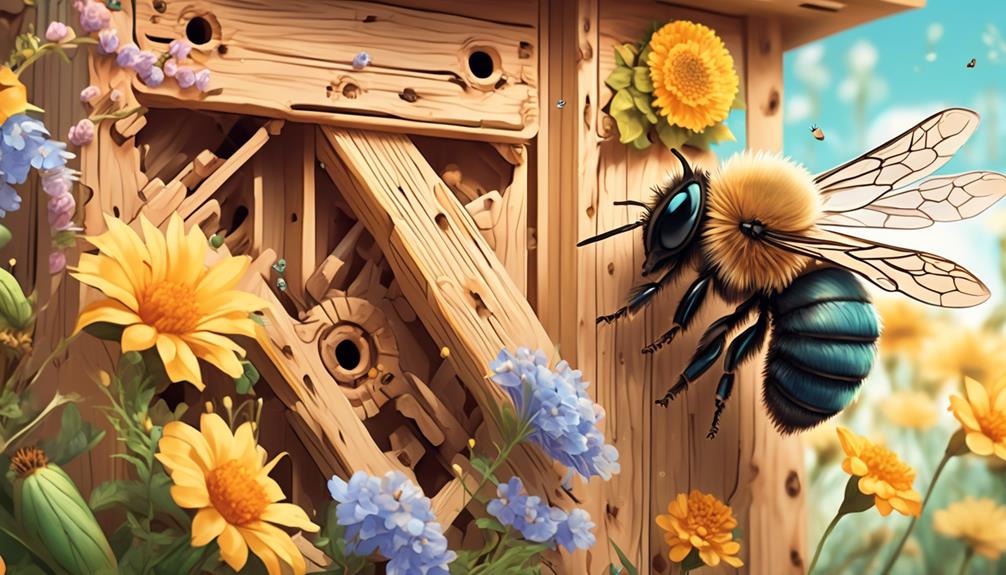
To truly comprehend the role of Mason Bees in our ecosystem, you need to delve into their unique biology, behavior, and their misunderstood relationship with human structures. Unlike honeybees, mason bees are solitary insects. Each female is a queen, building her own nest and laying her own eggs. They're also exceptional pollinators, with a single mason bee being as effective as 100 honeybees.
Mason bees aren't aggressive. Without a colony to defend, they're less likely to sting and therefore pose a minimal threat to humans. Their preference for nesting in small crevices and holes, however, often leads them to human structures, giving them an undeserved reputation as destructive pests.
In reality, mason bees aren't equipped to gnaw through wood or other hard materials. They're opportunistic, repurposing existing holes rather than creating new ones. Their nesting habits may even be beneficial, filling gaps that could otherwise be exploited by more destructive species.
Understanding these facts can help you appreciate the essential role mason bees play in our ecosystem. They're not pests, but vital links in the chain of biodiversity. Their presence is a sign of a healthy environment, not an impending infestation.
Mason Bees: Pollination Powerhouses
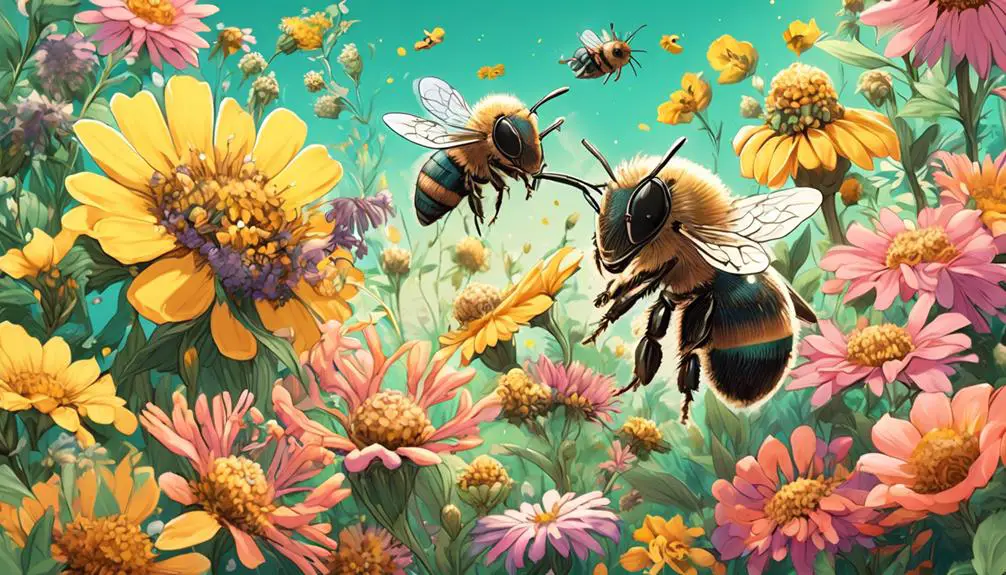
Building on their underappreciated role in our ecosystem, it's worth noting that mason bees are in fact veritable powerhouses when it comes to pollination. Unlike honeybees that tend to focus on one type of flower, mason bees aren't as selective, thereby increasing their pollination scope.
Analyzing their technique, you'll find that mason bees are 'messy' pollinators. They scatter pollen over a vast area, a trait that significantly boosts their pollination efficiency. They're solitary creatures, so they don't have a hive to protect or a queen to feed. This means they can focus solely on pollination, making them incredibly effective at their job.
Scientifically speaking, it's estimated that mason bees are up to 100 times more efficient at pollination than honeybees. This is because they carry pollen on their abdomen, where it easily brushes off onto flowers.
However, their population isn't as robust as it should be. Habitat loss, pesticides, and climate change are all threats to these pollination powerhouses. That said, if we conserve their habitats and provide them with the resources they need, mason bees can continue to play a crucial role in our ecosystem.
Potential Damage From Mason Bees
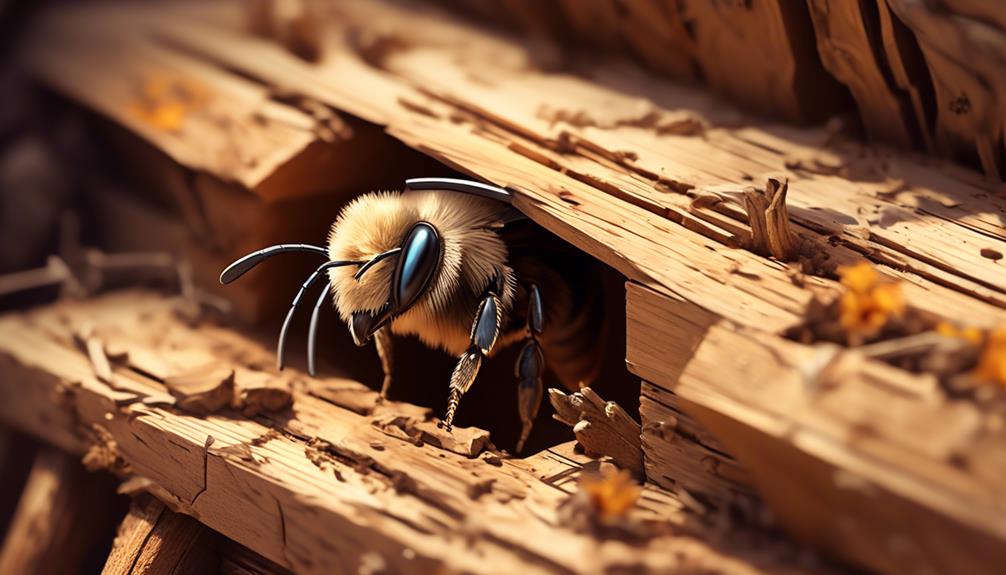
While it's undeniable that mason bees are beneficial for pollination, it's also important to consider any potential damage they could cause. Unlike honeybees or bumblebees, mason bees don't build large hives, but they do bore into wood to create nesting sites. This can lead to structural damage in untreated wooden structures, particularly those in your garden like sheds or benches.
You may also notice small, round holes in your wooden exterior. These are the entry points to the mason bee's nest. If left unchecked, these holes can accumulate, reducing the integrity of the wood. Additionally, their nesting behaviour can sometimes lead to unwanted displacement of other beneficial insects.
However, it's important to note that mason bees are solitary creatures. They don't swarm or live in large colonies. Each female mason bee builds her own nest and lays her own eggs. This means that the extent of the damage they can cause is significantly less than that of other wood-boring pests.
Mason Bees and Your Home
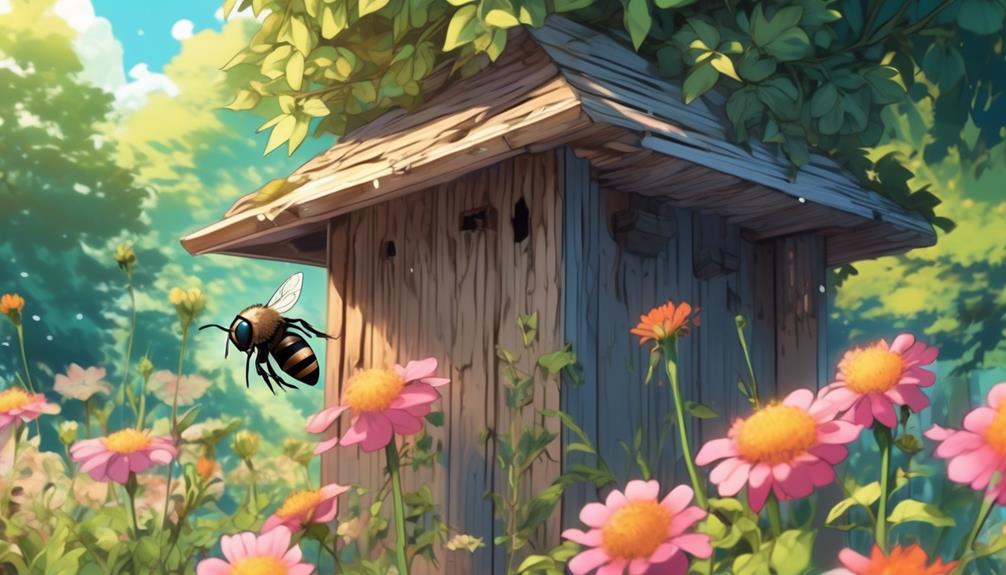
Despite the potential for minor structural damage in garden structures, it's your home's safety and integrity that may concern you when it comes to mason bees.
You'll be relieved to know that, unlike termites or carpenter bees, mason bees aren't typically destructive to homes. They're solitary bees and prefer to nest in pre-existing small holes, rather than boring into wood structures. Your wooden house frames or furniture aren't likely to be their chosen nesting sites.
However, they might take up residence in crevices and small openings within your home's structure. This could become problematic if large numbers of bees decide to nest in these spaces, potentially causing minor structural issues. They can fill these spaces with their mud nests, which, over time and in large quantities, could lead to some degradation.
You should also be aware of the potential for allergic reactions. Though mason bees aren't aggressive and rarely sting, individuals with bee allergies should be cautious.
Considering these factors, it's clear that while mason bees aren't inherently destructive, their presence may lead to minor inconveniences. Therefore, it's crucial to monitor their activity around your home and take necessary action as required.
Managing Mason Bees Responsibly
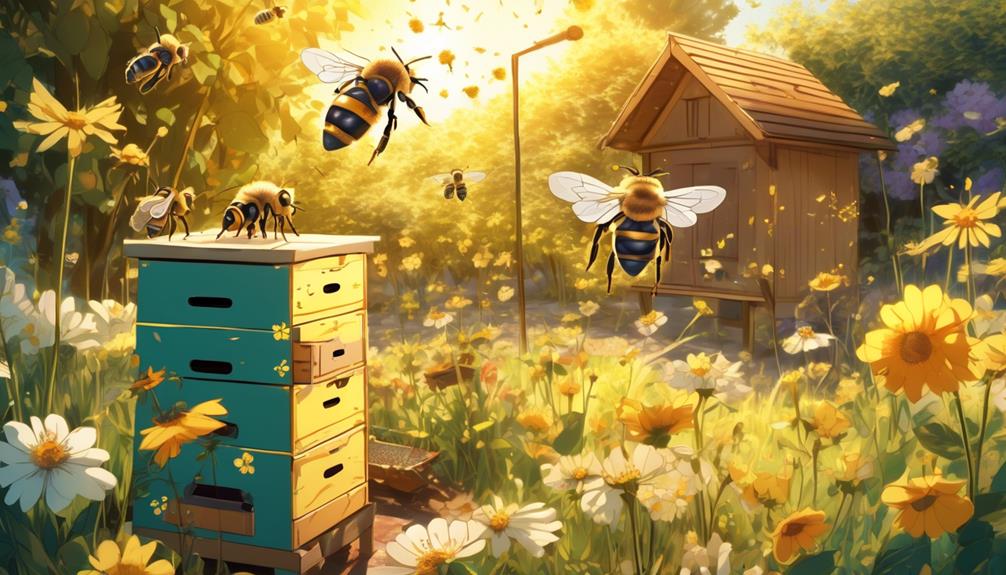
To responsibly manage mason bees around your home, it's important to thoroughly understand their behaviors and life cycles, and to take strategic, non-harmful actions as needed.
First off, you need to recognize that these bees are solitary and non-aggressive. They're not known for causing structural damage, as they prefer to nest in pre-existing cavities rather than burrowing into structures.
You can provide suitable habitats for them to reduce the chances of them nesting in inconvenient places. This could entail setting up a mason bee house, which are readily available in stores or online. These houses mimic the natural nesting sites of mason bees and can attract them away from your home.
Another critical aspect of managing mason bees is respecting their seasonal cycles. These creatures are most active in spring and early summer, and their nesting period concludes by mid-summer. Avoid disrupting their habitats during this time to prevent stress on the bees.
Lastly, remember that mason bees are beneficial insects that play a key role in pollination. By managing them responsibly, you're aiding in biodiversity and contributing to a healthier ecosystem. It's a win-win situation; you protect your home and promote a sustainable environment.
Debunking Common Mason Bee Myths
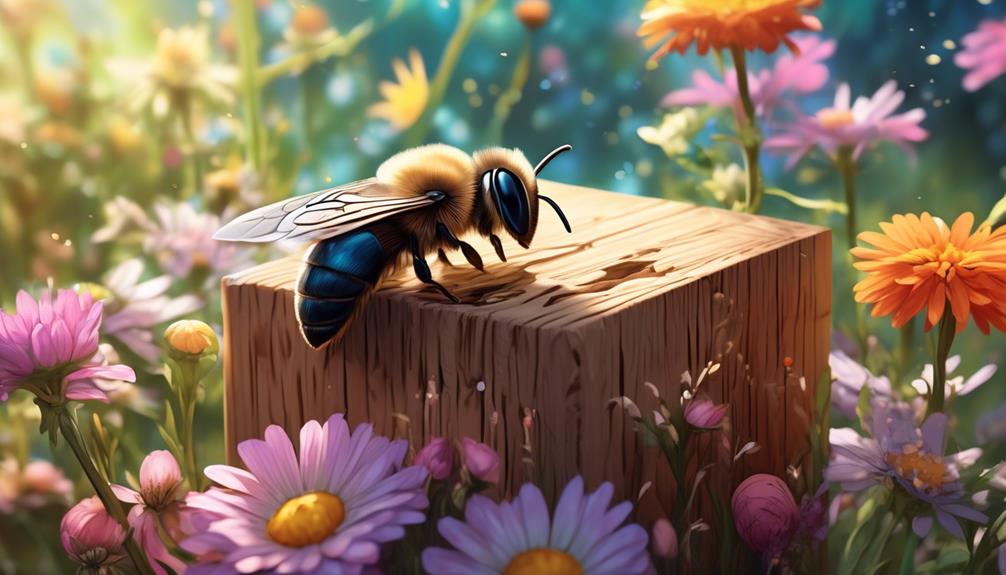
Let's bust some myths about mason bees that often cloud people's understanding and appreciation of these beneficial insects. Contrary to popular belief, mason bees aren't aggressive. Unlike honeybees or wasps, they don't live in colonies and therefore have no hive to defend. They'll only sting if they feel directly threatened, and even then, their sting is much less painful than that of other bees.
Another common misconception is that mason bees are destructive to wooden structures. In reality, they don't have the ability to bore into solid wood. They prefer existing holes and crevices, and their nesting activities don't cause any structural damage.
You might also hear that mason bees are lazy compared to their honeybee counterparts. This is simply not true. A single mason bee can do the work of 100 honeybees in terms of pollination. They're early risers, starting their work as soon as the sun hits their nests.
Lastly, it's incorrect to assume that mason bees will invade and take over honeybee hives. They're solitary creatures, each female building and provisioning her own nest. Understanding these facts will help you appreciate the unique role mason bees play in our ecosystem.
Frequently Asked Questions
What Is the Lifespan of a Mason Bee?
You're wondering about the lifespan of a mason bee.
These fascinating creatures don't live very long. The adult males live for only about two weeks after they emerge in the spring. Adult females tend to live a bit longer, usually around six weeks.
They're hardworking pollinators during their short lives.
It's worth noting that the mason bee's entire life cycle, from egg to adult, spans about one year.
How Do Mason Bees Differ From Honey Bees in Terms of Behavior and Appearance?
You're wondering how mason bees differ from honey bees in behavior and appearance.
Mason bees are solitary, unlike the social honey bees.
They're also metallic blue or greenish rather than the familiar yellow and black.
Behavior-wise, they don't produce honey or beeswax and are less likely to sting.
They're great pollinators, often more efficient than honey bees, making them an eco-friendly choice for gardeners.
What Type of Climate Do Mason Bees Thrive In?
You're curious about the type of climate mason bees thrive in. These industrious insects flourish best in temperate climates. They're not fans of extreme cold or heat.
Spring's mild weather is ideal for them, as it's when they emerge from their cocoons to pollinate. Mason bees need a combination of warm days to forage and cooler nights for resting.
Are There Any Specific Plants or Flowers That Attract Mason Bees?
You're curious about which plants attract mason bees.
They're not picky, but they do favor native plants and flowers.
Some favorites are fruit trees, dandelions, and plants in the rose family.
They're particularly attracted to blue and yellow flowers.
Mason bees also prefer flowers that are single layer, as they can easily access the pollen.
What Predators or Threats Do Mason Bees Face in the Wild?
No, mason bees aren't destructive. They're solitary bees, focusing on pollination rather than building large hives. They don't bore into wood like carpenter bees. Instead, they nest in pre-existing holes. They don't have a hive to protect, so they aren't aggressive.
Their activities actually benefit the ecosystem by aiding plant reproduction. You'll find they're more of a gardener's friend than a pest. So, you don't need to worry about these little pollinators causing any harm.
Conclusion
In conclusion, don't let common misconceptions misguide you. Mason bees aren't destructive. Yes, they might burrow into wood, but their impact is minimal and rarely harms healthy structures.
Their pollination prowess far outweighs any potential damage, making them beneficial for our ecosystem.
Rather than fearing these tiny powerhouses, embrace them. With responsible management, you can enjoy the benefits of mason bees without worrying about undue harm to your home.

